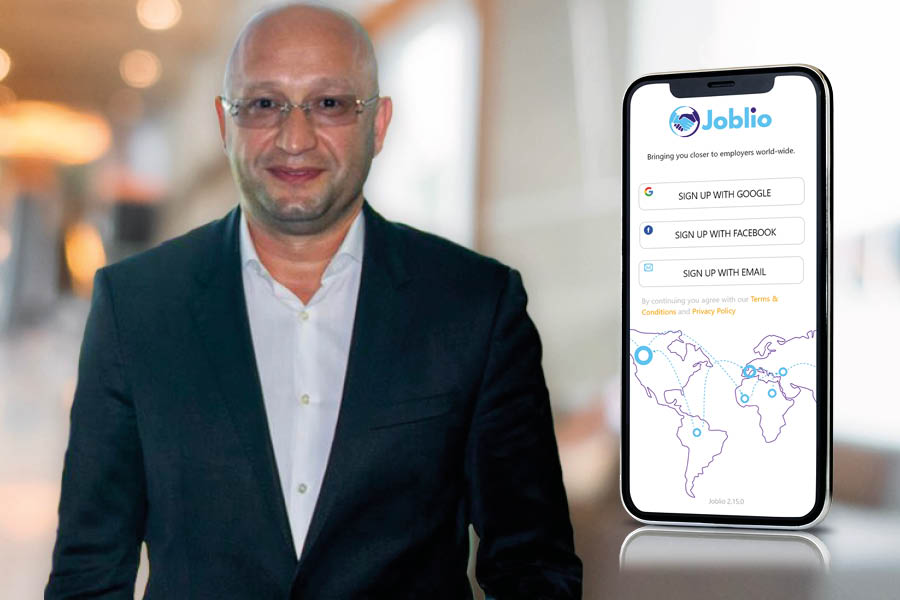Jon Purizhansky is a New York lawyer with years of international experience in leveraging technology to bring transparency and efficiency into otherwise non-transparent global ecosystems.
He is also the Founder and CEO of Joblio, a digital platform that prevents fraud, protects human rights, and provides a transparent and efficient hiring process for the global labour market.
“Joblio technology brings the light into the darkest space in the world – the industry of the global relocation of human capital.”
Monaco Life: What is the backstory of how you come to be where you are today?
Jon Purizhansky: I’m a refugee myself. I was born in Belarus in the former USSR and when I was 16, my family ran away to Austria with nothing, then to Italy. I was a stateless person in Europe in my teens, before I went to law school in New York and started practising immigration law. So, my whole life I have lived with a suitcase next to my bed.
I worked in global corporate location, which is basically moving people from anywhere to anywhere, and I saw all of the inefficiencies within the space that are primarily connected to the fact that unskilled labour migrants – who make up 90% of the global labour force – are not directly connected to their prospective employer in other countries.
Then how do these workers get jobs abroad and where’s the problem?
Irrespective of whether you are an African, South East Asian, Latin American or in the former Soviet Republics, for example, if you are an unskilled person and the local economy is unable to support you, you go to an ‘agent’ who sells you an opportunity to work abroad. But what actually happens in these relationships is that the agent becomes a sales person, and the prospective labour migrant becomes a consumer of a service, so the sales person is driven to present an opportunity more favourably than it really is so he or she can charge more money.
Essentially, if you’re an engineer and you live in India, you have the sophistication that is required to find work in a developed country and hire a lawyer or a consultant to facilitate the bureaucratic process. If you are a 22-year-old farmer in Nepal, you lack the sophistication, which is why you go to an agent.
Now, what happens is they don’t actually have any money to pay these agents. More than 60% of sub-Saharan Africa lives on 50 dollars per family per month. In Caracas, Venezuela’s capital, you’re lucky if you make a dollar a day. If you go into the provinces, you make less.
So, what they do is they borrow money, say 10,000 dollars, from predatory lenders or from family, based on the agent’s promise that they are going to make 2,000 dollars per month. They figure they’ll pay back the loan in six months.
They show up with a work visa class D here in Europe, for example, and all of a sudden they have a Polish employer who has no idea how to feed them because they eat rice and he’s offering bread and lard, they’re only making 800€ per month so they’re not earning enough to service the loan which is collateralised by their loved ones back home, and they run away.
This is how the European Union gains illegal immigration, crime and all sorts of human rights violations. All this stems from the fact that unskilled labour is recruited unethically today across the world. The agents are transactional and they add zero value.
How many people are we talking here?
The IOM (International Organisation for Migration) says that there are just south of three hundred million labour migrants in the world. In reality, the number is closer to a billion, because who is counting the intra-continental migration, all the people moving from Botswana to Rwanda, Bolivia to Chile, etc? Nobody knows.
How does your technology change this scenario?
Joblio is a technology-powered, social impact project, a private enterprise that connects unskilled and low-skilled prospective labour migrants with employers in the developed world.
How it works: an employer posts a job on Joblio, and the employee can go on the app, find a job, review the position, analyse the opportunity, be directly connected to the employer, and pay nothing.
As technology has walked into our lives via the smartphone, there really should be no reason why potential employees cannot be connected with their employers directly, thereby driving out the middle man.
But do all these people really have access to smartphones?
The proliferation of smartphone technology is unstoppable, it’s all over the world. Around 40% of Sub-Saharan adults have smartphones, and over 90% of south-east Asia owns a smartphone because refurbished Android phones in China cost a couple of dollars.
What’s in it for the employer?
Let’s say you are an employer with an agricultural company, a mega farm in Spain where you grow oranges. You need 5,000 people to pick oranges. Of the 5,000 workers who come, 4,500 of them were told they would make triple the money. They show up, they’re disappointed to be making a third of what they were promised, and they run away.
Now you, the employer, don’t have the people to pick your crops, thereby drastically reducing your efficiency and losing you money.
Here is another example: You are a construction company and need 100 painters to come and finish a job. All of a sudden, a bunch of guys from Nepal turn up who are promised that you are going to train them, but you actually needed trained staff. The construction industry suffers enormously from problems like this.
Why do you consider yourself a social impact project?
Our quest at Joblio is to create the most powerful impact in the world, as our total addressable market is the largest in the world and our business model evolves around the protection of human rights. The employer’s relationship with the employee does not begin when the employee commences the job, the relationship begins when the employee is recruited back home. That’s where the problem stems from. Joblio won’t get rid of child labour completely, but it will reduce it drastically; it won’t end the exploitation of women altogether, but it will reduce it drastically. For example, imagine you are a Philippine nanny and you live outside in the jungle somewhere in Cebu. You take a 20,000 dollar loan and your husband stays behind collateralising the loan, but you end up working for some weirdo who begins harassing you. Because you are unsophisticated in your thinking and lack the support, you are afraid to complain because you might lose your job and can’t pay back the loan, or you run away.
With Joblio, in every host country, we maintain three sets of legal expertise – immigration law, tax law, labour law. We advocate to those who don’t have a voice, and we protect human rights by being a private enterprise, solving a huge problem for the corporates. But we want to know that you are getting paid on time, because our fee is connected to how much you get paid.
Joblio stays with the labour migrant until they return to their home country.
What impact has Covid had?
Covid has impacted labour migrants enormously. Allegations of abuse filed with the International Labour Organisation during Covid have increased 275% because of the position people have found themselves in.
What do governments stand to gain out of this?
This is the eco-system: there is the migrant, the employer, the government of the host country and the government of the originating country. In today’s environment, the government of the host country is at a loss because it gains illegal immigration, human rights violations, crime and loses tax revenues because people run away and don’t pay taxes in these relationships.
The government of the originating country is at a loss because GDP is largely dependent on people sending money home from abroad. Joblio steps into this ecosystem and rearranges the elements within it by taking out the middle man who adds no value and who creates human rights violations and inefficiencies for the government and the employers alike. We kick them out and we bring transparency, compliance and human rights into this where now everyone wins. The worker is no longer cheated, the employer gets the staff that they need thereby creating revenues and optimising efficiency, the government wins because the human rights violations and crime are reduced and it gains money from taxing these employment relationships, and the government from the originating country wins because it gets to profit from the money sent home.
Where is Joblio at now and where is it going?
We employ a number of diplomats who work with the United Nations and we deal with all the ethical recruitment initiatives based on the Montreal Recommendations on Recruitment of 2020, and the United Nations Sustainability Goals, point number four of which is the end of slavery, point number eight is fair employment. All C-level executives at Joblio are refugees.
Every day, there is a family that we are helping. We launched a business development operation in Poland and Romania, and we’re experiencing explosive growth. In the UAE, we are integrating with the Ministry of Resources.
Our objective is to become the global standard and platform for cross-border employment, utilised by corporates and governments throughout the world.
Passing through Monaco: Joblio Founder Jon Purizhansky


